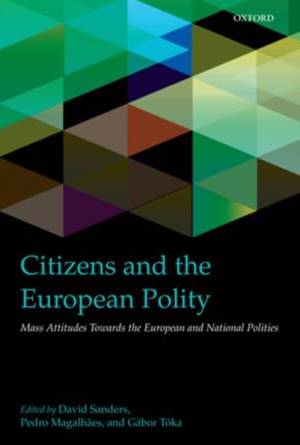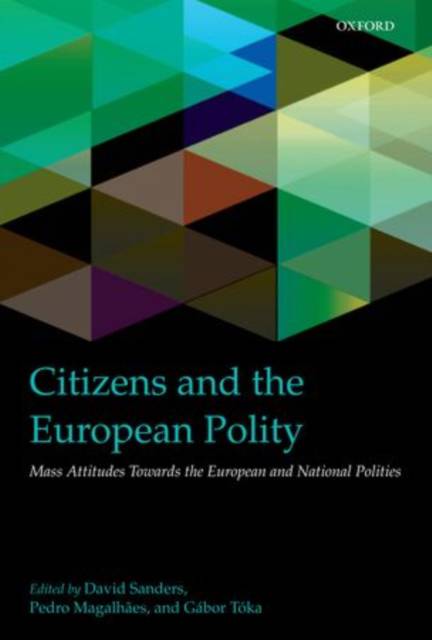
- Retrait gratuit dans votre magasin Club
- 7.000.000 titres dans notre catalogue
- Payer en toute sécurité
- Toujours un magasin près de chez vous
- Retrait gratuit dans votre magasin Club
- 7.000.0000 titres dans notre catalogue
- Payer en toute sécurité
- Toujours un magasin près de chez vous
Citizens and the European Polity
Mass Attitudes Towards the European and National Polities
David Sanders, Pedro Magalhaes, Gabor Toka
198,95 €
+ 397 points
Description
This book provides a broad overview of the main trends in mass attitudes towards domestic politics and European integration from the 1970s until today. Particularly in the last two decades, the "end of the permissive consensus" around European integration has forced analysts to place public opinion at the centre of their concerns. The book faces this challenge head on, and the overview it provides goes well beyond the most commonly used indicators. On the one hand, it shows how integration's deepening and enlargement involved polities and societies whose fundamental traits in terms of political culture - regime support, political engagement, ideological polarization - have remained anything but static or homogeneous. On the other hand, it addresses systematically what Scharpf (1999) has long identified as the main sources of the democratic deficits of the EU: the lack of a sense of collective identity, the lack of a Europe-wide structure for political accountability, and the lack
of recognition of the EU as a legitimate political authority. In other words, it focuses on the fundamental dimensions of how Europeans relate to the EU: identity (the sense of an "European political community"; representation (the perception that European elites and institutions articulate citizens' interests and are responsive to them); and policy scope (the legitimacy awarded to the EU as a proper locus of policy-making). It does so by employing a cohesive theoretical framework derived from the entire IntUne project, survey and macro-social data encompassing all EU member countries, and state-of-the-art methods. The IntUne series is edited by Maurizio Cotta and Pierangelo Isernia In a moment in which the EU is facing an important number of social, economic, political and cultural challenges, and its legitimacy and democratic capacities are increasingly questioned, it seems particularly important to address the issue of if and how EU citizenship is taking shape. This series intends to address this complex issue. It reports the main results of a quadrennial Europe-wide research project, financed under the 6th Framework Programme of the EU. That programme has studied the changes in the scope, nature and characteristics of citizenship presently underway as a result of the process of deepening and enlargement of the European Union. The INTUNE Project - Integrated and United: A Quest for Citizenship in an Ever Closer Europe - is one of the most recent and ambitious research attempts to empirically study how citizenship is changing in Europe. The Project lasted four years (2005-2009) and it involved 30 of the most distinguished European universities and research centres, with more than 100 senior and junior scholars as well as several dozen graduate students working on it. It had as its main focus an examination of how integration and decentralization processes, at both the national and European level, are affecting three major dimensions of citizenship: identity, representation, and scope of governance. It looked, in particular, at the relationships between political, social and economic elites, the general public, policy experts and the media, whose interactions nurture the dynamics of collective political identity, political legitimacy, representation, and standards of performance. In order to address empirically these issues, the INTUNE Project carried out two waves of mass and political, social and economic elite surveys in 18 countries, in 2007 and 2009; in-depth interviews with experts in five policy areas; extensive media analysis in four countries; and a documentary analysis of attitudes toward European integration, identity and citizenship. The book series presents and discusses in a coherent way the results coming out of this extensive set of new data. The series is organized around the two main axes of the INTUNE Project, to report how the issues of identity, representation and standards of good governance are constructed and reconstructed at the elite and citizen levels, and how mass-elite interactions affect the ability of elites to shape identity, representation and the scope of governance. A first set of four books will examine how identity, scope of governance and representation have been changing over time respectively at elites, media and public level. The next two books will present cross-level analysis of European and national identity on the one hand and problems of national and European representation and scope of governance on the other, in doing so comparing data at both the mass and elite level. A concluding volume will summarize the main results, framing them in a wider theoretical context.
of recognition of the EU as a legitimate political authority. In other words, it focuses on the fundamental dimensions of how Europeans relate to the EU: identity (the sense of an "European political community"; representation (the perception that European elites and institutions articulate citizens' interests and are responsive to them); and policy scope (the legitimacy awarded to the EU as a proper locus of policy-making). It does so by employing a cohesive theoretical framework derived from the entire IntUne project, survey and macro-social data encompassing all EU member countries, and state-of-the-art methods. The IntUne series is edited by Maurizio Cotta and Pierangelo Isernia In a moment in which the EU is facing an important number of social, economic, political and cultural challenges, and its legitimacy and democratic capacities are increasingly questioned, it seems particularly important to address the issue of if and how EU citizenship is taking shape. This series intends to address this complex issue. It reports the main results of a quadrennial Europe-wide research project, financed under the 6th Framework Programme of the EU. That programme has studied the changes in the scope, nature and characteristics of citizenship presently underway as a result of the process of deepening and enlargement of the European Union. The INTUNE Project - Integrated and United: A Quest for Citizenship in an Ever Closer Europe - is one of the most recent and ambitious research attempts to empirically study how citizenship is changing in Europe. The Project lasted four years (2005-2009) and it involved 30 of the most distinguished European universities and research centres, with more than 100 senior and junior scholars as well as several dozen graduate students working on it. It had as its main focus an examination of how integration and decentralization processes, at both the national and European level, are affecting three major dimensions of citizenship: identity, representation, and scope of governance. It looked, in particular, at the relationships between political, social and economic elites, the general public, policy experts and the media, whose interactions nurture the dynamics of collective political identity, political legitimacy, representation, and standards of performance. In order to address empirically these issues, the INTUNE Project carried out two waves of mass and political, social and economic elite surveys in 18 countries, in 2007 and 2009; in-depth interviews with experts in five policy areas; extensive media analysis in four countries; and a documentary analysis of attitudes toward European integration, identity and citizenship. The book series presents and discusses in a coherent way the results coming out of this extensive set of new data. The series is organized around the two main axes of the INTUNE Project, to report how the issues of identity, representation and standards of good governance are constructed and reconstructed at the elite and citizen levels, and how mass-elite interactions affect the ability of elites to shape identity, representation and the scope of governance. A first set of four books will examine how identity, scope of governance and representation have been changing over time respectively at elites, media and public level. The next two books will present cross-level analysis of European and national identity on the one hand and problems of national and European representation and scope of governance on the other, in doing so comparing data at both the mass and elite level. A concluding volume will summarize the main results, framing them in a wider theoretical context.
Spécifications
Parties prenantes
- Auteur(s) :
- Editeur:
Contenu
- Nombre de pages :
- 328
- Langue:
- Anglais
- Collection :
Caractéristiques
- EAN:
- 9780199602339
- Date de parution :
- 29-09-12
- Format:
- Livre relié
- Format numérique:
- Genaaid
- Dimensions :
- 236 mm x 163 mm
- Poids :
- 663 g

Les avis
Nous publions uniquement les avis qui respectent les conditions requises. Consultez nos conditions pour les avis.






